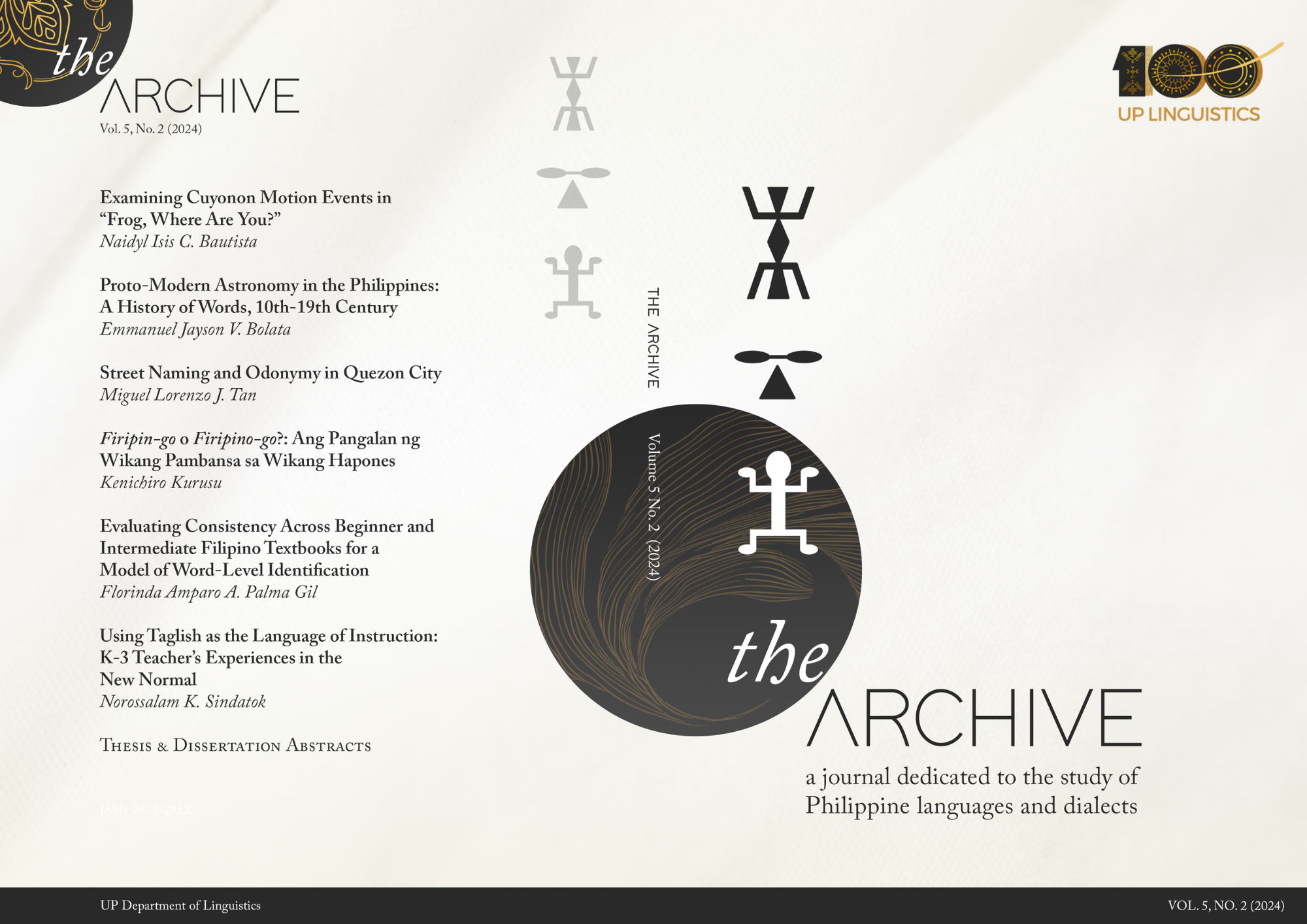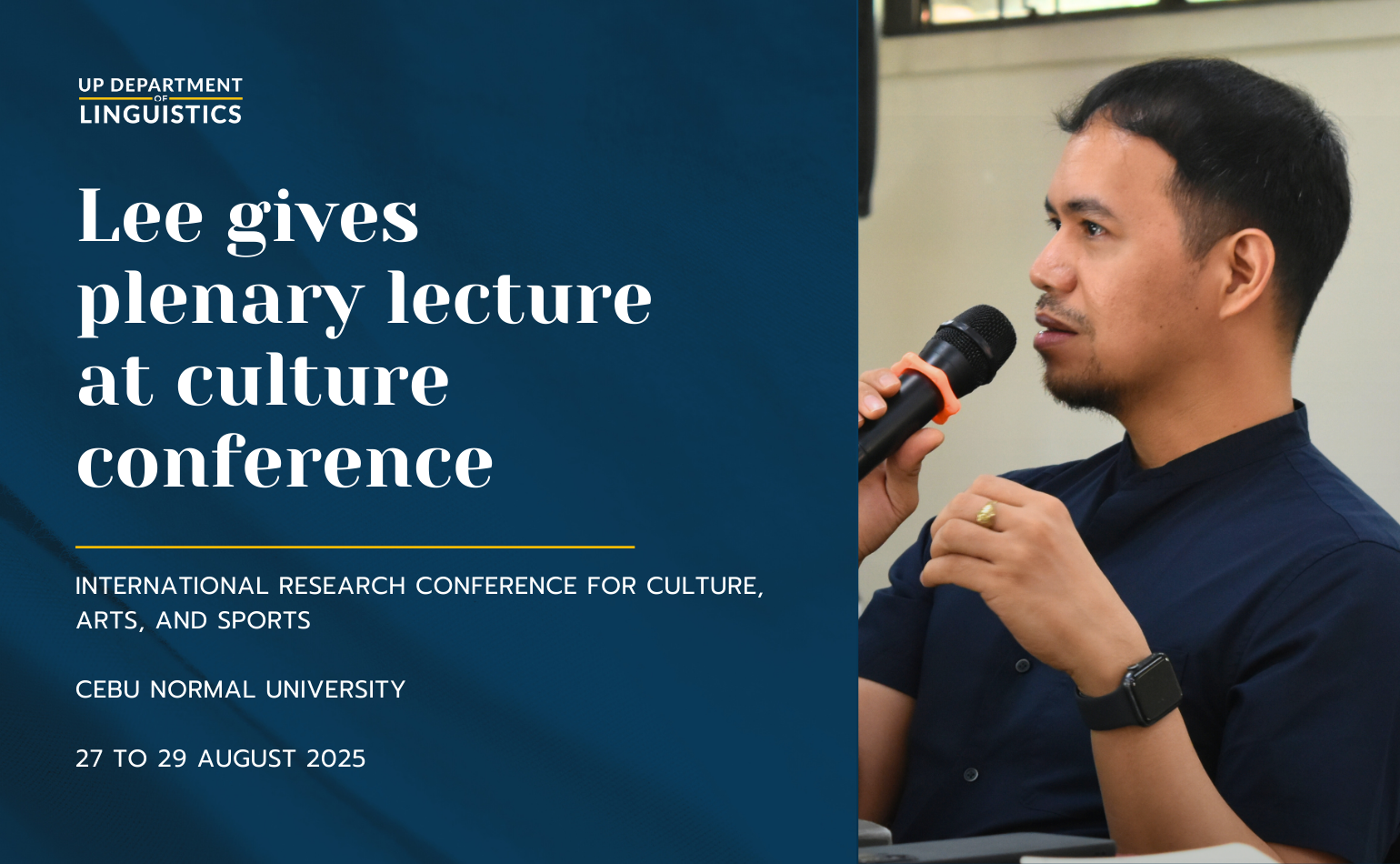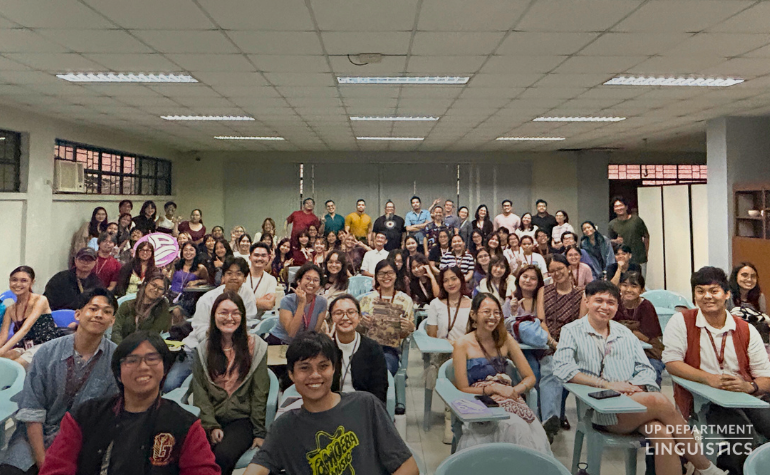
The Archive, the official publication of the UP Department of Linguistics, has released the second issue of its fifth regular volume, the latter of two issues on papers presented at the 15th Philippine Linguistics Congress (15PLC). It features articles on motion-encoding, Philippine proto-modern astronomy, urban street-naming (odonymy), and three papers on Filipino as the national language. It also contains the abstracts of theses from recent graduates of the Master of Arts program of the Department.
This issue was helmed by Assoc. Prof. Jem R. Javier (editor-in-chief), Assoc. Prof. Maria Kristina S. Gallego (issue editor), Asst. Prof. Divine Angeli P. Endriga (managing editor), Brian Salvador C. Baran (editorial assistant and layout), James Dominic R. Manrique (editorial assistant and cover design), and Victoria N. Vidal (administrative assistant). The latest issue can be accessed via this link.
A Platform for Linguistic Research
Held as part of the Department’s 100th anniversary celebration, 15PLC brought together scholars from various linguistic disciplines to discuss key research areas, including language documentation, historical linguistics, language and culture, Filipino as the national language, and the teaching of Asian national languages. The conference highlighted the Department’s role as the leading institution for the study and preservation of Philippine languages. This volume encapsulates the Department’s commitment to linguistic research, documentation, and education, marking the culmination of its centennial founding anniversary.
The 15PLC Book of Abstracts is available in this link. Moreover, the book of abstracts of all Philippine Linguistics Congress conducted are accessible in the PLC Digital Repository.
Featured Papers
This issue of The Archive showcases diverse linguistic research presented at 15PLC:
Language Documentation and Description
Naidyl Isis C. Bautista’s “Examining Cuyonon Motion Events in ‘Frog, Where Are You?’” investigates how motion is encoded in Cuyonon using the children’s storybook as a stimulus. The study provides empirical insights into how different languages encode motion events.
Historical and Comparative Linguistics
Emmanuel Jayson V. Bolata’s “Proto-Modern Astronomy: A History of Words, 10th-19th Century” explores indigenous astronomical concepts from Proto-Austronesian reconstructions and their linguistic development through historical contact with Sanskrit, Arabic, and Malay influences. The study highlights the enduring presence of indigenous knowledge systems, which persist alongside—and despite—the prevailing influence of Western scholarship.
Language and Culture
Miguel Lorenzo J. Tan examines “Street Naming and Odonymy in Quezon City.” The study illustrates that despite rapid urbanization and globalization, distinctive cultural traditions continue to shape and influence our everyday linguistic environment, as reflected in the traditional toponymic strategies, such as naming streets after flora, etc.
Filipino as the National Language
- Kenichiro Kurusu’s “Firipin-go o Firipino-go?: Ang Pangalan ng Wikang Pambansa ng Pilipinas sa Wikang Hapones” explores the differing Japanese terms used to refer to Filipino in books and official documents. The author highlights the practical challenges this inconsistency presents and argues how the variation poses obstacles to language planning, potentially impeding the growth of the national language. The study underscores the power of linguistic labels in shaping discussions on nationalism and identity.
- Florinda Amparo Palma Gil’s “Evaluating Consistency Across Beginner and Intermediate Filipino Textbooks for a Model of Word Level Identification” assesses the consistency of vocabulary in language textbooks used to teach Filipino as a second or foreign language. This research lays the groundwork for improving language education and proficiency assessment, especially for heritage and second/foreign language learners.
- Norossalam K. Sindatok’s “Using Taglish as the Language of Instruction: K-3 Teachers’ Experiences in the New Normal” reveals both positive and negative outcomes to using Taglish as an LOI over the mother tongue in a multilingual community. The research highlights how a lingua franca often becomes the default instructional language when faced with many choices, illustrating the interconnectedness of language use in local contexts and national policy decisions.
The issue concludes with abstracts from recent MA Linguistics theses: Noah D.U. Cruz’s “Ang Pagtatasa sa Sigla ng mga Wika at Diyalekto sa Pilipinas: Kalagayan at Patutunguhan”; Johans B. Cruz’s “Pagbabalik-Tanaw sa Linkers: Isang Historikal na Pagsusuri sa mga Piling Wika sa Pilipinas”; Edward G. Estrera’s “Bagobo-Klata: Grammar and Vocabulary”; and Dave Ryan Mikhail S. Go’s “A Typological Comparison of Tagalog, Malay, Äiwoo, Hawaiian and Thai.” The full works are available in the University of the Philippines library.
Continuing the Tradition of Linguistic Excellence
The UP Department of Linguistics remains steadfast in its commitment to expanding the frontiers of Philippine linguistics. Issue editor Maria Kristina Gallego notes that “the Philippines, with its high linguistic diversity, offers plenty of opportunities to investigate linguistic phenomena, ranging from structural, historical, interdisciplinary, to applied.” As it embarks on its next century, the Department intends to deepen its research endeavors, ensuring the continued study and preservation of the country’s rich linguistic heritage.
The Archive was originally published in the 1920s by Otto Johns Scheerer as a repository for working papers of the Department’s graduate students. It now publishes research outputs in three different categories: the Regular Issue, which is the peer-reviewed publication for original works dealing primarily but not exclusively with Philippine languages and dialects; the Special Publication, which is a venue for publishing single, extensive works on Philippine languages, translations, and other similar works; and the Classics series, which reprints monumental works in Philippine linguistics that paved the way for further research in the field and continue to influence current studies on Philippine languages.
The Archive accepts submissions all year round. It is officially hosted by the UP Diliman Office of the Vice-Chancellor for Research and Development, through the UP Diliman Journals Online website, where previous and current issues of the journal may be freely accessed and downloaded. More information about the journal and submission guidelines are available through this link.
Published by Divine Angeli P. Endriga



